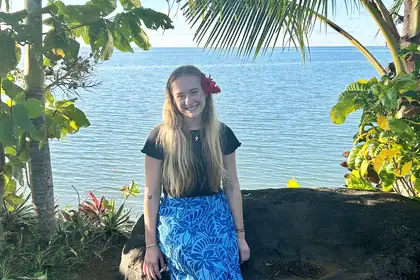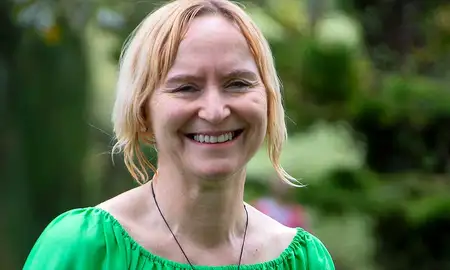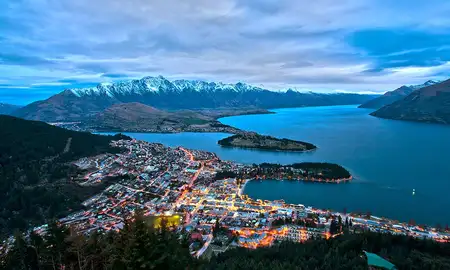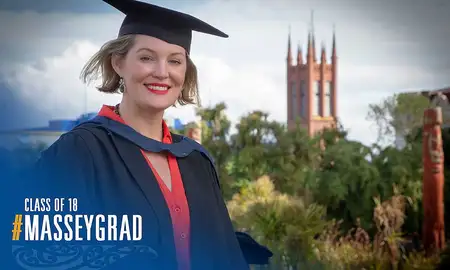
Due to join the Samoa Tourism Authority in March as a Volunteer Service Abroad (VSA) volunteer, Isabella’s role will involve advising colleagues on how to access international funding to help them adapt their tourism strategies for climate change.
Isabella says it’s a subject she knows well, as she researched climate financing for Samoa’s sustainable tourism development in her master’s thesis.
“I’ve always been interested in Samoan culture. I was able to spend five weeks there for fieldwork research in July, thanks to a DevNet and a Ministry of Foreign Affairs and Trade Field Research Award. Within one day of being there, I loved what Samoa has to offer.”
During her visit, Isabella contacted the local VSA coordinator who suggested she get in touch with Samoa Tourism. Keen to have her expertise, they offered her the position of Climate Change Finance Assistant.
“I’m super excited for this opportunity. The tourism industry is in the process of looking at what they need to do to adapt to climate change, as most of the industry is located on the seashore. You’ve got sea level rise to contend with and coastal erosion, plus the cost of recovery from natural disasters like cyclones,” Isabella says.
“There hasn’t been a lot of research into how to finance the adaptations needed due to climate change, but the two big areas for discussion are moving back inland from the beachfront and diversifying tourism offerings beyond beach holidays.”
Isabella’s thesis focused on how climate financing mechanisms, such as the Green Climate Fund and other multilateral environment funds, can support small and medium-sized tourism enterprises to be sustainable.
“For example, the Samoa Tourism Authority talks about tour group accommodation and improving and diversifying what they offer to include things like coral snorkelling or local food-orientated activities. Most of Samoa’s resorts are smaller than what you’d find somewhere like Fiji, and typically they’re locally owned.”
Accessing international climate finance requires time and effort, Isabella adds, both of which may be a stretch for a small government struggling to cope with other pressing issues such as the recovery from COVID-19 and high inflation costs.
“Typically, it’s a lengthy process involving very detailed proposals. I can assist with proposals and teach other people about how to access resourcing to help in adapting to climate change,” she says.
“Samoa has good relationships with its development partners like the United Nations Development Programme (UNDP) team – they realise applying for funds is an issue for a lot of countries.”
Another factor Isabella says she is conscious of is how climate finance needs to align with Samoan values and their communal way of life, summed up in the term ‘fa’a Samoa’ or ‘the Samoan way’.
“It’s up to the Samoan people themselves to decide what they want to do. An example of this is after a weather event, a lot of coastal people in Samoa want to build back on the coast rather than move inland. My research looks at having these decisions in local hands.
“The Samoan Tourism Authority has started having discussions with coast-based operators creating awareness that in 10 years’ time, the sea might rise to the extent that a move will be inevitable.”
Reflecting on what she was taught during her International Development studies, Isabella says there was a big focus on looking at the ways in which global economic, social, political and environment forces affect people and shape different parts of the world.
“We were taught why development theories in the past didn’t work, when developed countries told developing countries what to do and how to do it. Views are constantly changing. Some donors still want things to be done on their terms. Massey teaches the importance of focusing on a country’s wellbeing and its needs and values.”
Isabella’s research highlights the importance of sustainable tourism development in Samoa. Samoans have seen the environmental and social damage that over-tourism has brought elsewhere, she says.
“While they want to grow the tourism industry, it needs to be to an optimum level where the benefits outweigh the costs.”
Isabella says her dream 10-month opportunity in Samoa is the result of a lot of hard work and taking the initiative while being in the right place at the right time. Following this, Isabella is considering continuing her studies for a PhD in climate finance and sustainable tourism development.
“I had no idea that International Development studies existed before I went to Massey. Even now, I have to explain what it is to people. It’s changed my perspective on the whole world and how it operates. The important thing is that it’s interdisciplinary. It can relate pretty well to every topic and offer a new perspective.”
Related news
James Cook Fellowship for research into sustainable tourism in the Pacific
Development Studies specialist Professor Regina Scheyvens has been awarded the James Cook Fellowship for 2020 in recognition of her sustained research excellence.

Living the tourism dream sustainably
Environmental and social impacts of tourism - from freedom campers to overcrowded national park trails and accommodation shortages in Queenstown - must be balanced with benefits says the convener of a conference on sustainable tourism.

Tourism insider to development studies scholar
Master of International Development graduate Loren Rutherford went from working as a tourism industry insider to pursuing academic research critiquing tourism's impact on local communities it relies on.
